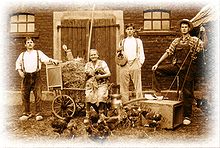Die Rhöner Säuwäntzt
| Die Rhöner Säuwäntzt | |
|---|---|

Die Rhöner Säuwäntzt with Scholze Agatha 1994
|
|
| Background information | |
| Origin | Eichenzell |
| Genres | Skiffle, Folk |
| Years active | 1994 to present |
| Website | www |
| Members |
|
Die Rhöner Säuwäntzt are a Skiffle-Bluesband from Eichenzell-Lütter in Hessen, Germany. The line-up consists of Martin Caba, Christoph Günther and Christoph Leipold playing Skiffle-Blues with lyrics based on Rhön Mountains dialect and other Hessian dialects varieties. The expression Säuwäntzt means pork belly and refers also to untidy or unruly children and youth.
The band started as a one-event session at a local festival in Fulda in 1994. An unexpected success led the members to continue working together. The band members have a blue-collar background and express this in their lyrics and musical style. The band's motto, Musik von den Baumwollfeldern der Rhön, translates into Music played on the Rhön Cotton Fields. The band members present themselves in hillbilly costumes, with corduroy trousers, braces and wooden shoes, and the acts include story telling and musical comedy on stage. Among the musical instruments in use are milk churns, electric shavers and wrenches; sometimes brass elements are added as well. The musical styles besides the peasant blues include Latin American rhythms, techno and also German pop, and they sometimes also make ironic use of operetta lines and melodies or standards, adapting them in line with their hayseed image. The band has played at regional festivals and events in Germany. It has been presented in German TV and radio. Contributions to major festivals include among others Internationales Tanz und Folkfest Rudolstadt, Bardentreffen Nuremberg and the international street musician competition in Osnabrück. The band has been described as a peculiar folk music invention with both rural down-to-earth and anarchic aspects.
Session with friends
Frontman Martin Caba
Christoph Günther, bass
Christoph Leibold, wash board and milk churn
The band's lyrics involve more or less burlesque and serious aspects of life and work in the countryside, some ribaldry, bumpkin blues and horseplay included.Thüringer Allgemeine highlighted a typical text example:
...
Wikipedia
